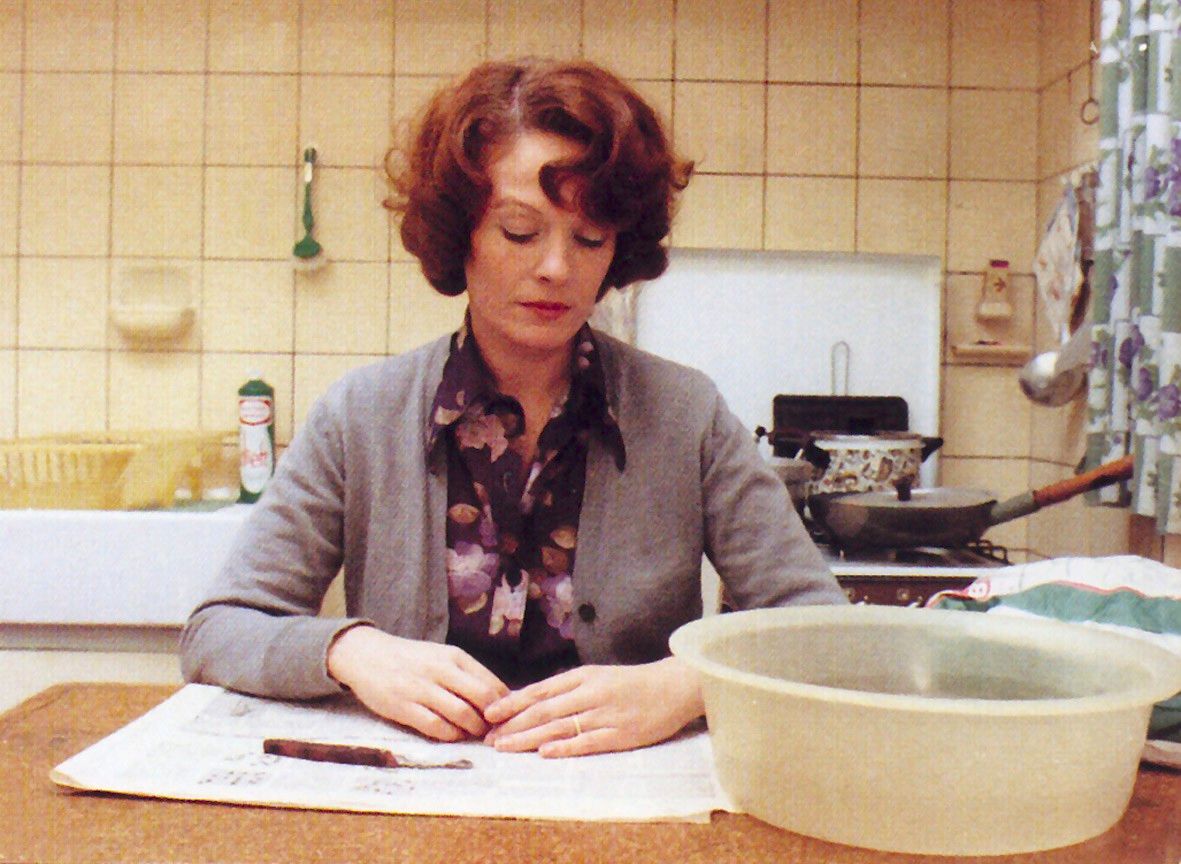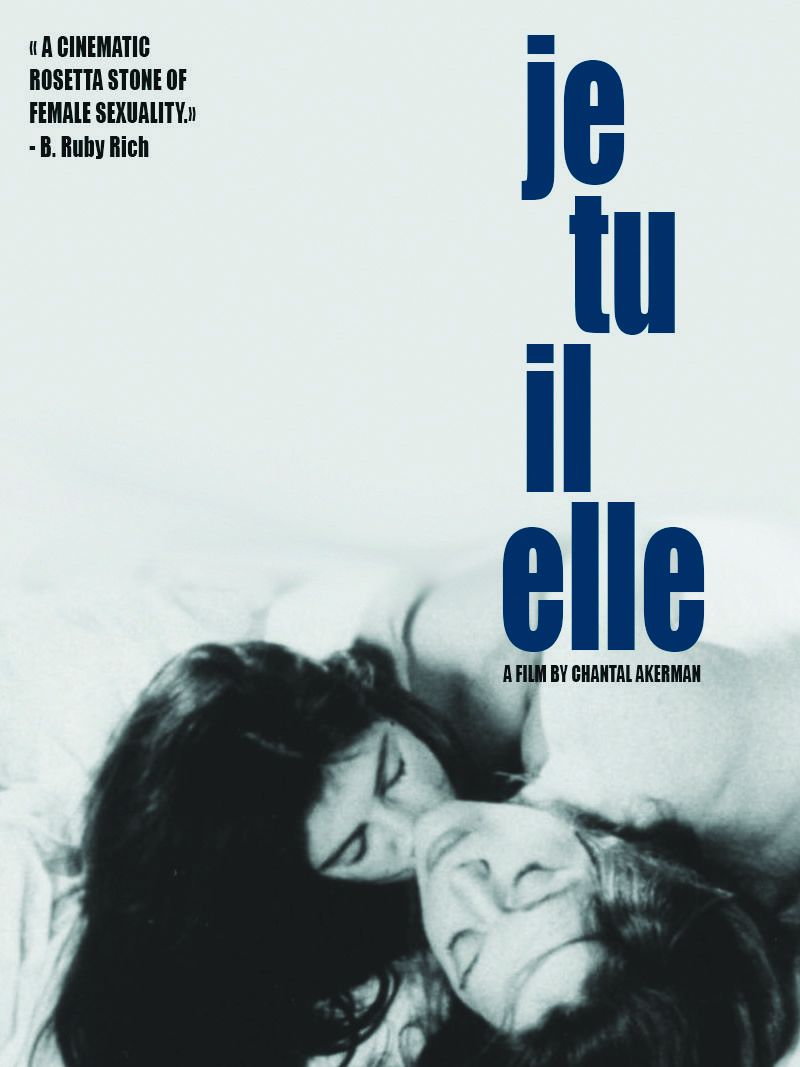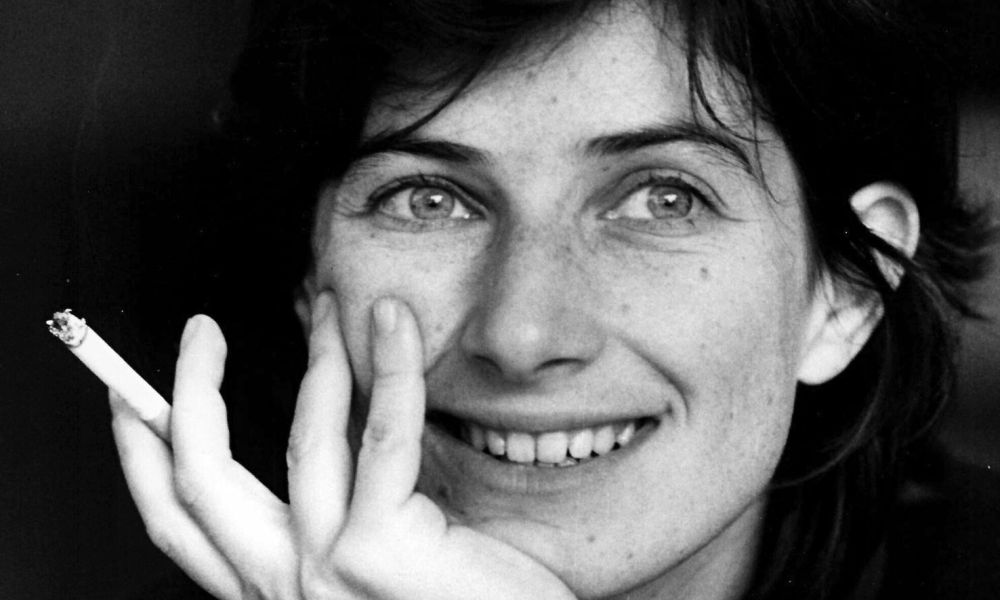"Akerman has moved from the avant-garde to art cinema, from feminist experiment to European auteur film... Akerman's cinema remains marginal, yet it should not be marginalised since its fundamental project is to challenge our preconceptions of what cinema can or should be." - Cathy Fowler (Encyclopedia of European Cinema, 1995)
Chantal Akerman
Director / Screenwriter / Actress / Producer / Cinematographer
(1950-2015) Born June 6, Brussels, Belgium
Top 250 Directors
(1950-2015) Born June 6, Brussels, Belgium
Top 250 Directors
Key Production Countries: France, Belgium, West Germany, USA
Key Genres: Drama, Documentary, Culture & Society, Romance, Comedy, Short Film, Urban Drama, Music, Avant-garde/Experimental, Psychological Drama, Feminist Film, LGBT-Related Film
Key Collaborators: Claire Atherton (Editor), Aurore Clément (Leading Actress), Rémon Fromont (Cinematographer), Francine Sandberg (Editor), Babette Mangolte (Cinematographer), Marilyn Watelet (Producer), Delphine Seyrig (Leading Actress), Xavier Carniaux (Producer), Geneviève Luciani (Editor), Patrick Mimouni (Editor), Marc Hérouet (Composer), Christian Marti (Production Designer)
Key Genres: Drama, Documentary, Culture & Society, Romance, Comedy, Short Film, Urban Drama, Music, Avant-garde/Experimental, Psychological Drama, Feminist Film, LGBT-Related Film
Key Collaborators: Claire Atherton (Editor), Aurore Clément (Leading Actress), Rémon Fromont (Cinematographer), Francine Sandberg (Editor), Babette Mangolte (Cinematographer), Marilyn Watelet (Producer), Delphine Seyrig (Leading Actress), Xavier Carniaux (Producer), Geneviève Luciani (Editor), Patrick Mimouni (Editor), Marc Hérouet (Composer), Christian Marti (Production Designer)
"Arguably the most important European director of the 1970s and 1980s, Chantal Akerman has a spare visual style that is matched only by the uncompromising ferocity of her individual vision as a filmmaker. Her upbringing was anything but privileged and this hardscrabble beginning encouraged Akerman to have compassion for the disenfranchised, a theme that runs through all her work... Although Akerman's films seldom play outside the festival circuit, her dry, acerbic vision of human existence has proven deeply influential for a younger generation of feminist filmmakers." - Wheeler Winston Dixon (501 Movie Directors, 2007)
"At the age of fifteen Chantal Akerman saw Godard's Pierrot le fou and realized that filmmaking could be experimental and personal. She dropped in and out of film school and has since created short and feature films for viewers who appreciate the opportunity her works provide to think about sounds and images. Her films are often shot in real time, and in space that is part of the characters' identity." - Lillian Schiff (The St. James Film Directors Encyclopedia, 1998)

Jeanne Dielman, 23 Quai du Commerce, 1080 Bruxelles (1975)
"Belgian-born director who makes long, often tedious, but sometimes hypnotically watchable arthouse films in which the camera's concentration on scenes for a long period of time can turn the viewer's pleasure into discomfort, interest into boredom or disinterest into perception. A unique film-maker, she continues to alternately baffle and fascinate her audiences." - David Quinlan (Quinlan's Film Directors, 1999)
"Chantal Akerman was commonly described as a Belgian film-maker, but this label hardly does justice to the breadth of her identity as an artist, nor to her nomadic nature. As well as filming in her native country, Akerman… worked extensively in the US, as well as in eastern Europe, Israel, Mexico, China and elsewhere, making fiction, documentary, experimental and essay films. She also made video and installation art. The marginal position she sometimes occupied in the film world had much to do with her eclectic practice, which made it hard to assign her a neat “auteur” identity. Nevertheless, from early in her career, Akerman attained a somewhat legendary status among cinephiles as a cinematic radical, a formal innovator and a pioneer of modern feminist cinema." - Jonathan Romney (The Guardian, 2015)
"Independent filmmaker noted for her minimalist narratives and static visual style... Her films, often dramatically vague and nearly plotless, typically seek to explore human emotion and character through unorthodox cinematic means. Although she is admired by serious critics, her films are barely accessible to general audiences." - The MacMillan International Film Encyclopedia, 1994
"For almost 50 years, until her suicide on 5 October 2015, Chantal Akerman was one of the cinema’s most original postwar auteurs – a documentarian, anecdotist, comedian, chanteuse, and restless innovator. She was Jewish, born in 1950 to Auschwitz survivor Natalia Akerman, and over the course of her many shorts, features, and installations, Chantal obsessively chronicled the legacy of her ancestors." - Michael Ewins (BFI, 2016)
"The Village Voice's film critic J. Hoberman once boldy described Chantal Akerman as "comparable in force and originality to Godard or Fassbinder... arguably the most important European director of her generation". Far more read about than viewed, Akerman's oeuvre comprises over forty films, more than half of them feature-length works of fiction or documentary... Restlessness, self-exposure and alienation are threaded as themes throughout Akerman's oeuvre, but any autobiographical elements are shrouded in fiction so that her films conceal as much as they expose." - Leslie Felperin (The Rough Guide to Film, 2007)
"Akerman was an autodidact who, very early on, intuited the limitations of a traditional filmmaking education. She was cognizant of the singularity of her vision. Throughout the 1970s—amid the opening act of her prodigious career—she absorbed the influences of the cutting edge of the era’s culture, which she digested and applied, tout de suite, to her own emotional terrain. The young filmmaker’s formidable first decade of work illuminates her inner world, giving shape to her experiences as a traveling artist and a modern woman who was simultaneously at odds with and a product of the previous generation—its inhibitions and domestic shackles." - Beatrice Loayza (The Criterion Collection, 2024)
"The essence of Chantal Akerman's minimalist style is a static camera, medium long shots, and monologues, as well as silences that get close to the heart of her alienated characters. The most characteristic film by Akerman is Jeanne Dielman, 23 Quai du Commerce, 1080 Bruxelles (1975), which reveals the minutiae of three days (225 minutes of film time) in the life of a Belgian housewife and part-time prostitute (Delphine Seyrig)." - Ronald Bergan (Film - Eyewitness Companions, 2006)
"The plotting in Akerman's films is minimal or nonexistent, and she is dedicated to the ellipses of conventional narrative cinema. In this way, she bravely avoids clichés, and the viewer is expected to approach her films with open eyes and mind. The excitement is within the characters, coming from the impossibility of situating oneself comfortably in the world. She often uses collage technique to insert the many autobiographical passages. Nevertheless, Akerman also investigates the hot-button themes like racism in the American South, illegal immigration, and terrorism in the Middle East.." - The European Graduate School Biography
"In my films I follow an opposite trajectory to that of the makers of political films. They have a skeleton, an idea and then they put on flesh: I have in the first place the flesh, the skeleton appears later." - Chantal Akerman
Selected Filmography
{{row.titlelong}}
GF Greatest Films ranking (★ Top 1000 ● Top 2500)
21C 21st Century ranking (☆ Top 1000)
T TSPDT R Jonathan Rosenbaum
21C 21st Century ranking (☆ Top 1000)
T TSPDT R Jonathan Rosenbaum
Chantal Akerman / Favourite Films
Le Bonheur (1965) Agnès Varda, Une Chambre en ville (1982) Jacques Demy, Fear Eats the Soul (1974) Rainer Werner Fassbinder, Happy Together (1997) Wong Kar-wai, Last Days (2005) Gus Van Sant, Mamma Roma (1962) Pier Paolo Pasolini, Moses and Aaron (1975) Jean-Marie Straub & Danièle Huillet, Mouchette (1967) Robert Bresson, Pierrot le fou (1965) Jean-Luc Godard, La Région centrale (1971) Michael Snow, Stromboli (1950) Roberto Rossellini, Tabu (1931) F.W. Murnau, Vertigo (1958) Alfred Hitchcock, Written on the Wind (1956) Douglas Sirk.
Source: Austrian Film Museum (2011)
Le Bonheur (1965) Agnès Varda, Une Chambre en ville (1982) Jacques Demy, Fear Eats the Soul (1974) Rainer Werner Fassbinder, Happy Together (1997) Wong Kar-wai, Last Days (2005) Gus Van Sant, Mamma Roma (1962) Pier Paolo Pasolini, Moses and Aaron (1975) Jean-Marie Straub & Danièle Huillet, Mouchette (1967) Robert Bresson, Pierrot le fou (1965) Jean-Luc Godard, La Région centrale (1971) Michael Snow, Stromboli (1950) Roberto Rossellini, Tabu (1931) F.W. Murnau, Vertigo (1958) Alfred Hitchcock, Written on the Wind (1956) Douglas Sirk.
Source: Austrian Film Museum (2011)
Chantal Akerman / Fan Club
Adrian Martin, Amy Taubin, J. Hoberman, Laura Mulvey, Richard Brody, Tim Robey, Ira Sachs, Joanna Hogg, Miriam Bale, Berenice Reynaud, Michael Koresky, Tim Grierson.
Adrian Martin, Amy Taubin, J. Hoberman, Laura Mulvey, Richard Brody, Tim Robey, Ira Sachs, Joanna Hogg, Miriam Bale, Berenice Reynaud, Michael Koresky, Tim Grierson.
"Fan Club"
These film critics/filmmakers have, on multiple occasions, selected this director’s work within film ballots/lists that they have submitted.
These film critics/filmmakers have, on multiple occasions, selected this director’s work within film ballots/lists that they have submitted.


